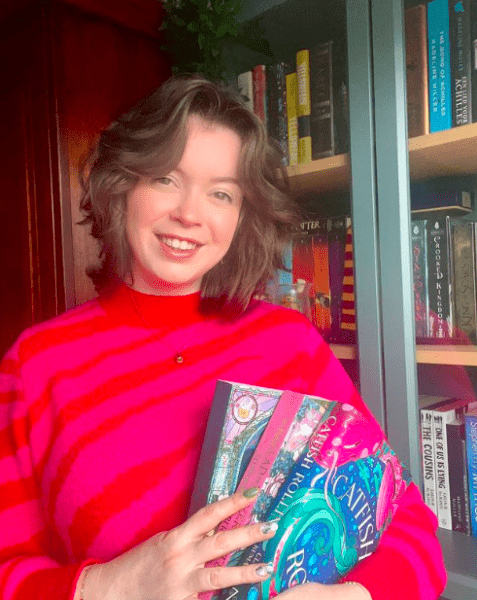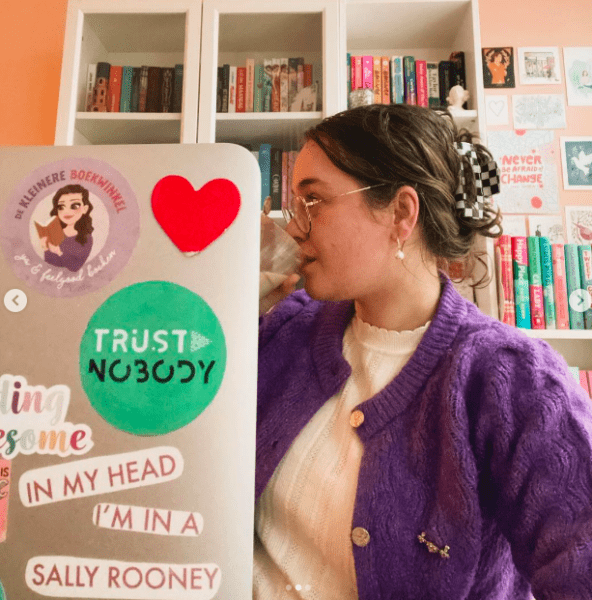Thank you for visiting our blog. We are the bridge between the reading community and you. Reach out to us if you'd like to collaborate with bookish creators.
Page Links
Instagram Feed
2023 © Bookinfluencers.Com. All Rights Reserved.
Getting started as an author can be difficult. Maybe you are already writing your own novel, or writing (fan) fiction online but your dream is to become a published author one day. We’ve got you. We are Paula Heeger, community manager at Bookinfluencers and romance author (Dutch debut coming May 2025) and Hanne Eerdekens (Flemish author of two queer YA novels). These are our stories, our tips and tricks and everything you need and want to know about writing, finding a publisher, opportunities for young authors and getting into the book world in general.
HANNE: “My name is Hanne Eerdekens, I’m a Belgian author, writing Dutch queer young adult novels. My debut novel is called ‘Met jou is het anders’, a story about a teen boy discovering his sexuality through the pressure of social media. My second book, ‘Polaris’, which comes out next month, is about a girl who, after losing her best friend, tries to get her life back on track with the help of an advent calendar made by that best friend, and she is confronted with her sexuality along the way.”

PAULA: “I’m Paula Heeger, community manager at bookinfluencers.com, freelancer, booktoker and an author (it still feels a bit weird to say that!) I already wrote a short romance story called Boekhandel aan zee that got published in Slipperdagen & Zomerjurken, filled with stories by 8 authors set in summer. My first romance novel will be published in Dutch at Zomer & Keuning in May 2025.”

PAULA: “I love to write about complex characters – people who have been through difficult things in life. Whether it’s losing someone you love or heartbreak. I try to find the balance between in my stories, the balance we all seek after those things happen, between giving something a little place in your heart and going on with your life and laughing again. Hopefully readers will laugh while reading my debut, but they might need a tissue on the side as well for a little tear. I hope they will see that laughing out loud and crying or grieving can exist together in life. You can cry in public when you see peanut butter in the grocery store because it reminds you of a loved one that passed away, but years or months later the same peanut butter makes you smile, because it makes you think about them.”
HANNE: “I hope that people who can relate find comfort in them, and see themselves represented in the characters. For people who aren’t queer themselves, I hope they learn something by stepping in the shoes of someone who is. Reading enhances empathy, so I hope those people learn something from that different perspective.”
HANNE: “I’ve been writing since I learned how to write, from cringy hand-written stories to short stories and fan-fictions. I had always dreamed of becoming a published author, but I thought that was still years away, until I wrote ‘Met jou is het anders’. I wrote that book for myself because I missed the queer young adult genre in Dutch literature, but when I finished, I wondered if there would be an audience out there with people like me, waiting for books like these.
So I started with a dream and a manuscript, solely created out of my own wishes and hopes. Whether you’re 12 or 82, finishing a manuscript is the hardest part of writing a book, so I was already halfway there. Afterwards, I contacted a bunch of publishers via e-mail. I sent them a synopsis and my manuscript, and two months later, Flemish publisher Pelckmans contacted me, asking me to pay them a visit. That’s where it started and I’m still so happy I signed with them.”
PAULA: “First of all: write and write and write. I studied journalism, read a ton of books and wrote a lot of articles online, in newspapers and magazines about every topic you can think of. I also always wrote stories on my laptop, just for myself. Whatever you do: keep writing. It can be fan fiction, it can be something on Wattpad. There are success stories from authors who started on writing platforms too – you can actually be that too. Last but definitely not least: start that online channel to share your process. People want to see the authentic you even if you think they don’t.”
PAULA: “I started by creating a blog where I first wrote about lifestyle topics and later specifically about books. This wasn’t the original plan, but I got to know the book world because of that. I went to events with publishers and year by year I knew more people who were in that world. I shared my love for reading on my blog, later on Instagram and TikTok. Now I even work for Bookinfluencers.com. By gaining an audience, publishers can be more interested as well, besides the talent you must have. I would really recommend starting an online channel where you share more about your writing process and your love for books – stay close to yourself and trust the process.”
It’s important though, to note that this is the case for Belgium, the Netherlands and most other European countries. In the United States and UK, networking and/or a literary agent is still often required to find an in with a publisher.
HANNE: “There are many ways to do so, but in Belgium, the two most common ways are through connections or via e-mail. If you go to book events, you can chat with people from different publishing companies. If you talk about your idea and they’re interested, they might give you contact details. I didn’t have any network whatsoever when I wanted to publish my debut novel at 22 years old. This meant I chose the e-mail route. I researched publishing companies and chose five that I thought might be interested in a queer YA novel. Not all publishing companies cater to the same audience, so it’s important to do your research. If you choose that route, be prepared for the waiting game, though. It’s definitely an option, it worked for me, but the success rate sadly isn’t very high.”
PAULA: “First I would say that I absolutely recommend to write in your native language. I see a lot of people nowadays that start writing in English, even if it’s not their first language. If English isn’t your native language either, look at publishers in your own countries. Most of them want younger authors these days, so take a look at their website and find out how they work. Maybe you have to e-mail your manuscript directly to them or write a pitch. The way in is way more easy than you think, you just have to try and keep trying.”
HANNE: “It plays a huge role! It helps me connect with readers, it gives me immediate feedback and it gives me confidence when I see so many positive responses from my direct audience. And, today, it’s also a marketing strategy. I cater to young adults, so advertising books is mostly done through social media. Banners in book stores or flyers in goodie bags simply aren’t effective anymore. My publisher sent my book to a few bookinfluencers, in the hope that they would like it and post about it. Luckily, they did and they still are for a big part responsible for the success of my debut novel. I’m so incredibly grateful for that still.”
PAULA: “A totally agree with Hanne on this. If you don’t have an audience yet, start today. Make a channel on the platform you prefer and share your process – people want to see you. I have a few thousand followers on Instagram and almost 10K on TikTok and make writing vlogs and short reels about writing my book. Take your readers-to-be with you in the progress, from writing the manuscript to sending it, from cover reveal to your book presentation. And of course, bookish creators will help you a lot in this, especially the ones who keep following you.”
@paulaleest Ik geloof dit nog steeds niet hoor 🥹 MEI 2025 @Uitgeverij Zomer & Keuning #boekentips #schrijven #auteur #schrijver #booktok
♬ original sound – James Jones
HANNE: “I was very insecure when I started my BookTok and Bookstagram account. I didn’t post my face because I was worried people I knew in real life would think it was weird. I learned a lot since then, and grew a lot as well.
My first “do” is: show yourself exactly how you are. The internet is a bit like real life: people will connect with you, or they won’t, but they’re much more likely to be interested when they see a person on the screen with an actual personality.
My second “do”, specifically as an author is: respond to readers! I’ve had some very meaningful conversations with people who read my book. It’s so great to hear what it meant to them and how they experienced it. That’s what writing is about, isn’t it?
Something you definitely shouldn’t do: respond to negative feedback. Everyone is allowed their own opinion and even if you don’t agree or you think someone misunderstood something you wrote, don’t try to convince them otherwise. It’s not a good look and usually not very effective. If someone is looking for a clarification, definitely reply! But some people have made up their minds about your writing and that’s a battle you cannot – and probably should not want to – win.”
PAULA: “If you love to write, keep doing it! My best advice is also to join writing contests. I did that myself a couple times and one short romance story actually got published in a real book (there is even an audio book of it!). Writing contests are a good way in and help you too, often you get some feedback and you meet new people online. People get to know you because of those contests and it keeps you writing (we all need a strict deadline sometimes!), especially if you don’t know how to start your first book yet. I loved that I started with a short story, because it inspired by upcoming debut and I finally knew how I wanted to write and learnt what I wanted to tell.”
HANNE: “Write, write and never stop writing. I wrote maybe ten books before I wrote my debut novel. They will never see the light of day, but they taught me so much about writing. I found my own style, learned how to build characters and write dialogue. Your first book is never going to be great (usually), but it’s still an important stepping stone. So never stop writing, whether it be poems, short stories, fan-fictions or entire books, until you have something you’re proud of. And even then, you never stop learning when it comes to writing. Let others read your work and ask feedback, join writing competitions and always keep writing.”






Thank you for visiting our blog. We are the bridge between the reading community and you. Reach out to us if you'd like to collaborate with bookish creators.
2023 © Bookinfluencers.Com. All Rights Reserved.